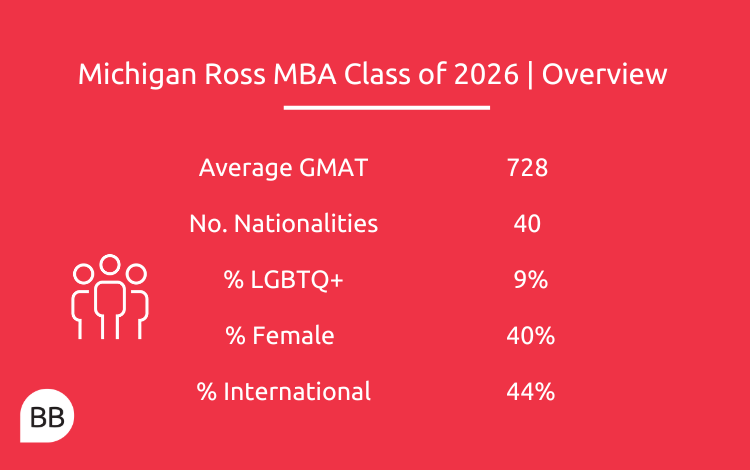Located in Ann Arbor, Michigan Ross School of Business is celebrated as one of the top MBA programs in the country, ranking 12th in the 2024 US News MBA Rankings.
The incoming MBA class of 2026 brings together 396 students with diverse professional and academic experiences from around the world.
From impressive GMAT scores to a wide range of industry expertise, here’s a closer look at what defines this dynamic group—and what it takes to join them at Michigan Ross.
Michigan Ross MBA class of 2026 | Overview
The Michigan Ross MBA class of 2026 is as academically strong as it is diverse, comprised of 396 students with varied industry and educational backgrounds.
The class boasts an average GPA of 3.42 and a GMAT score of 728 under the previous GMAT (10th Edition) scoring, with each student averaging six years of prior work experience.
The cohort is notably diverse: Women make up 40% of the class, and 53% identify as US students of color, including 29% from underrepresented minority groups. While the class of 2026 sees a slight drop in the percentage of women, from 43% to 40%, it also gains in international representation (44%), with students hailing from 40 countries, up from 39.
The class also brings significant socioeconomic diversity, with 22% first-generation college students and 15% military veterans, while 11% of students are pursuing dual degrees.

Michigan Ross MBA | GMAT and GRE scores
As the leading standardized test for business school admissions, the GMAT recently introduced changes to its structure and scoring.
While scores are still awarded in 10-point intervals, the scale now ranges from 205 to 805, replacing the previous 200-800. Fortunately, candidates who took the test before February 2024 can still use their scores for up to five years.
The Michigan Ross MBA class of 2026 achieved an average GMAT score of 728 under the previous system, which translates to roughly 665-675 on the scale in the latest edition of the GMAT. The middle 80% of the class scored between 690 and 760, equivalent to a range of 635-735 under the updated scale.
GRE averages were similarly strong, with Quantitative scores at 162 and Verbal at 159.
While a strong GMAT score can greatly enhance your MBA application, high-achieving candidates can still secure a spot on the Ross MBA program without taking the exam. Instead, applicants can submit a ‘Statement of Academic Readiness’, allowing them to showcase alternative evidence of their academic capabilities and readiness for the rigorous curriculum.
Michigan Ross MBA | Pre-MBA industry backgrounds
The Michigan Ross MBA class of 2026 enters the program with an impressive average of six years of work experience, drawing from a wide array of industries.
Finance tops the list, representing 21% of the cohort, while consulting accounts for 17%. Technology and engineering/manufacturing fields are well represented at 14% each, contributing strong technical skills to the class.
The incoming class also features students from diverse sectors, including healthcare (8%), the military (5%), and media, hospitality, and sports (5%), as well as energy and sustainability (5%).
A smaller yet significant portion (4%) comes from education, nonprofit, and government sectors, bringing a variety of perspectives to the classroom.
Class of 2026 pre-MBA industries
Michigan Ross MBA | Undergraduate majors and GPA
The average GPA for the MBA class of 2026 is a strong 3.42, with students coming from diverse academic backgrounds that equip them to tackle business challenges from multiple perspectives.
Nearly 40% of the cohort holds business degrees, while 38% come from STEM fields, bringing a strong foundation in analytical thinking and technical proficiency. The remaining 23% are humanities graduates, contributing creative problem-solving skills.

Securing a spot on the Michigan Ross MBA program is no easy feat.
The class of 2026 is academically strong, boasting high GMAT scores and an average of six years of professional experience per student. Joining this cohort means learning alongside a talented and diverse group of professionals from various industries.
To stand out in the competitive admissions process, it’s important to highlight your unique perspectives and experiences, demonstrating how you’ll contribute to the MBA learning environment.
While many graduates pursue traditional MBA routes—60% of the class of 2023 went into consulting and tech—the program also offers flexibility for students to chart your own path.
With optional electives in AI, supply chain management, and energy markets, alongside concentrations in ESG, data analytics, and healthcare management, Michigan Ross provides students with the chance to align their MBA experience with their career ambitions.




